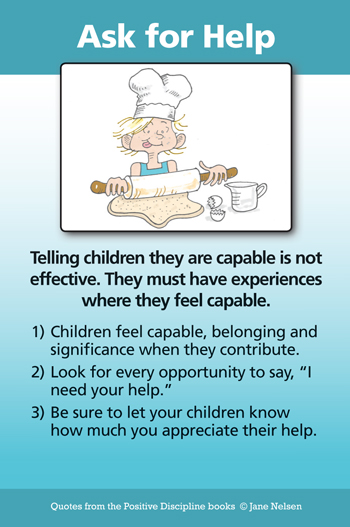by Jane Nelsen and Mary Nelsen Tamborski
Excerpt from the Positive Discipline Parenting Tools Book

A Positive Discipline Tool Card
Telling children they are capable is not effective. They must have experiences where they feel capable.
1. Children feel capable, belonging, and significance when they contribute.
2. Look for every opportunity to say, “I need your help.”
3. Be sure to let your children know how much you appreciate their help.
Parents don’t realize how much they can damage their children’s character when they do too much for them in the name of being a good parent, and in the name of love.
When parents do everything for the child, it is likely that the child will decide, “I’m not capable,” or “Love means getting others to do things for me.” Then parents wonder, “Why does my child act so demanding after all I have done for her?”
Alfred Adler taught that the measure of good mental health was the level of gemeinschaftsgefüel, a German word he coined. The word has so much meaning that it is difficult to translate into English, but “social consciousness” and “social interest” come close. Adler believed that mentally healthy people had a desire to contribute to their social community, beginning with the family. Research keeps proving what Adler taught: allowing children to make meaningful contributions in their homes is a key to the development of a healthy sense of self-worth and capability.
I believe the desire to help starts at an early age—as soon as they start walking and talking. I have vivid memories of all three of my boys saying, “Me do it.” Yes, it requires a lot of patience and some training, but the more my boys did, the more confident they became.
Below is a list of examples you might try that worked in our home. I'm sure you can think of many others.
HELP FROM 1-YEAR-OLDS
- Putting the diapers away and in the trash
- Picking up toys (lots of modeling and mirroring)
- Cleaning up messes with wipes
- Kissing boo-boos better and offering a hug when someone is hurt or feeling bad
HELP FROM TODDLERS
- Buckling their car seat (or at least trying to)
- Stirring the mix for muffins (even cracking the eggs)
- Getting themselves dressed, starting with pajamas (they likely need help with zippers, buttons and snaps)
- Clearing their dishes from the table
- Putting toys away
- Pushing buttons on washer and dryer
- Folding laundry (starting with washcloths and socks)
- Pushing the stroller (or at least attempting)
- Carrying groceries (make sure to pack a couple of light bags)
- Looking for groceries in the store (for example, asking for help finding the milk, bananas, or bread)
- Sweeping and cleaning (having supplies made for little hands, such as a kid-sized broom or little spray bottle filled with water, helps them feel like they’re contributing to the chores)
- Trash (toddlers love to throw stuff away)
- Washing their bodies and hair in the bathtub
HELP FROM ELEMENTARY AGE
- Help creating grocery lists
- Help with preparation of meals
- Folding and putting laundry away
- Bringing up trash cans from the bottom of the driveway
- Cleaning their rooms (this one requires the use of many Positive Discipline tools)
- Clearing dishes at mealtimes
- Unloading dishwasher
- Vacuuming
- Sweeping leaves
- Wrapping gifts for birthday parties
- Creating paper bags of goodies for the homeless
- Decorating for every season
Some of these chores are done with more enthusiasm than others. It would be easier to do many of them myself, but I keep the long-term results in mind. I want my boys to be contributing members of society, not spoiled brats. Someday the wives of my boys will thank me.



Comments
Ask for Help examples
I love the Ask for Help examples that work at home. Is that list available in Spanish? If so, can you please share that? We would love to use it with parents in a bilingual class. Please let me know. Thank you.
Spanish
AYUDA DE 1 AÑO-OLDS
Poniendo los pañales en la basura
Recogiendo juguetes (muchos ejemplos y reflejos)
Limpiando líos con toallitas
Besar boo-boos mejor y ofrecer un abrazo cuando alguien está herido o se siente mal
AYUDA DE LOS NIÑOS PEQUEÑOS
Abrochando su asiento del auto (o al menos tratando de hacerlo)
Revolviendo la mezcla para muffins (incluso rajando los huevos)
Vestirse, comenzando con pijamas (es probable que necesiten ayuda con cremalleras, botones y broches)
Despejando sus platos de la mesa
Guardando juguetes
Presionando botones en la lavadora y secadora
Lavadero plegable (comenzando con paños y calcetines)
Empujando la carriola (o al menos intentando)
Llevar comestibles (asegúrese de empacar un par de bolsas ligeras)
Buscando comestibles en la tienda (por ejemplo, pidiendo ayuda para encontrar la leche, los plátanos o el pan)
Barrer y limpiar (tener suministros hechos para manos pequeñas, como una escoba del tamaño de un niño o una pequeña botella con atomizador llena de agua, les ayuda a sentir que están contribuyendo a las tareas domésticas)
Basura (a los niños pequeños les encanta tirar cosas)
Lavarse el cuerpo y el cabello en la bañera
AYUDA DE EDAD ELEMENTAL
Ayuda a crear listas de compras
Ayuda con la preparación de las comidas
Plegar y poner la ropa de distancia
Levantando botes de basura del fondo del camino de entrada
Limpieza de sus habitaciones (esta requiere el uso de muchas herramientas de Disciplina positiva)
Limpiando platos a la hora de comer
Descarga de lavavajillas
Pasar la aspiradora
Hojas de barrido
Envolviendo regalos para fiestas de cumpleaños
Creación de bolsas de papel de golosinas para personas sin hogar.
Decoración para cada temporada